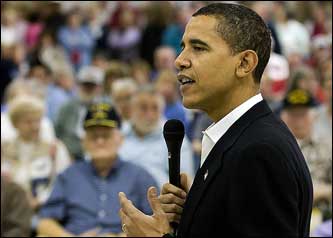
Those who personally witnessed Barack Obama’s Philadelphia speech on race were riveted by what many consider to be an address of historic importance. Given the sobering nature of the moment, ovations from the Constitution Center audience were few and far between. However, at least one remark by Obama drew applause: It was his recalling of the well-worn saying that the “most segregated hour in American life occurs on Sunday morning.”
This truism pushes out beyond the pews and continues to be played out long after Obama’s speech ended. Whether critical or laudatory of Obama’s words, the predominantly white editorial voices in the mainstream press largely agreed that Reverend Jeremiah Wright’s comments were scandalous, racist, and far afield of sober public opinion.
On the other hand, many of my fellow black folk and people of color understand why Obama had to distance himself from Wright’s remarks, but they don’t necessarily disagree with those remarks themselves. (In the same way, many people of color understand that Michelle Obama’s comments about being proud of the United States for the first time in her life were politically clumsy, but not the least bit unreasonable.) They might not openly discuss this around an integrated office watercooler, but such expressions of sympathy with Wright’s point of view can be found in side conversations at the office, inside people’s homes, in Internet chat rooms, and in the barber shops and hair salons that Obama references in his speech. And despite Obama’s claims to the contrary, this conversation is happening across generational lines, among the embittered and the upbeat alike.
Even the comments by Wright considered to be the most incendiary — the idea that the violence directed against Americans on September 11, 2001, was karmic comeuppance for America’s legacy of imperialism and violence abroad — resonate widely in the black community and in houses of faith. Just like Obama condemned Wright’s remarks, Elijah Muhammad sanctioned Nation of Islam Minister Malcolm X because he made the “chickens coming home to roost” comments about the assassination of John F. Kennedy, comments that also tread on what is considered to be sacred political ground.
Reverend Wright is hardly a fringe figure on the American religious scene. The church where he pastored until recently, the Trinity United Church of Christ, has over 10,000 members. The reason Wright’s views figure so prominently at Trinity and countless other black churches is because the black church, going back to the time of slavery, has always been the place where black folks have indulged in conversations considered subversive.
Furthermore, Reverend Wright is not unlike countless other kente cloth–clad ministers throughout the country with sizable followings who are critical of everything from right-wing politics to hip-hop music. These messages are inseparable from a promotion of self-determination, self-help, and self-love, which some might dismiss as Black Nationalism.
In the same way the black church incubated so much political activity during the civil rights movement, Trinity United Church of Christ was compelling enough to Barack Obama that he was a member for 20 years and gave tens of thousands of dollars to it. For politically conscious black folk — particularly members of the middle class who are acutely aware of glass ceilings — their church can provide a space where racial justice is viewed in spiritual terms, a sanctuary where hard truths can be spoken and where righteous political action can be inspired. The Bible — a text that champions struggles against state power, oppression, and injustice — is the perfect trumpet of this message.
While Obama bravely waded deeply into the waters of race, he profoundly understated how much Reverend Wright speaks for a great deal of black people across the country, including Obama himself. That is something from which neither America nor candidate Obama can hide.
Mark Winston Griffith is senior fellow for economic justice at the Drum Major Institute for Public Policy.
- Follow us on Twitter: @inthefray
- Comment on stories or like us on Facebook
- Subscribe to our free email newsletter
- Send us your writing, photography, or artwork
- Republish our Creative Commons-licensed content

